Top Rankings
Hamilton Township School District ranks among the top 20% of public school district in New Jersey for:
Category
Attribute
Diversity
Most diverse schools (Top 1%)
For the 2025 school year, there is 1 public middle school serving 883 students in Hamilton Township School District. This district's average middle testing ranking is 1/10, which is in the bottom 50% of public middle schools in New Jersey.
Public Middle School in Hamilton Township School District have an average math proficiency score of 14% (versus the New Jersey public middle school average of 32%), and reading proficiency score of 22% (versus the 48% statewide average).
Minority enrollment is 66% of the student body (majority Hispanic and Black), which is less than the New Jersey public middle school average of 68% (majority Hispanic).
Overview
This School District
This State (NJ)
# Schools
3 Schools
835 Schools
# Students
2,853 Students
458,046 Students
# Teachers
256 Teachers
39,885 Teachers
Student : Teacher Ratio
11:1
11:1
District Rank
Hamilton Township School District, which is ranked within the bottom 50% of all 646 school districts in New Jersey (based off of combined math and reading proficiency testing data) for the 2021-2022 school year.
Overall District Rank
#569 out of 650 school districts
(Bottom 50%)
(Bottom 50%)
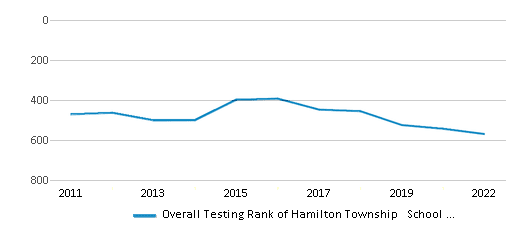
Math Test Scores (% Proficient)
19%
36%
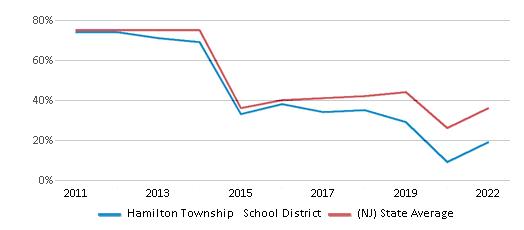
Reading/Language Arts Test Scores (% Proficient)
26%
49%
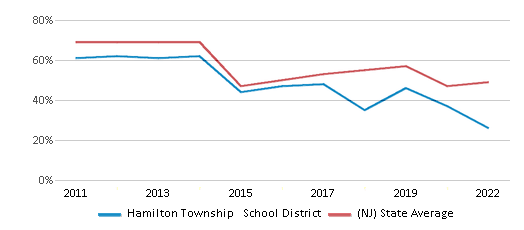
Science Test Scores (% Proficient)
11%
23%
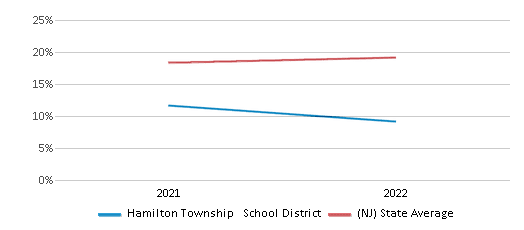
Students by Ethnicity:
Diversity Score
0.74
0.72
# American Indian Students
7 Students
913 Students
% American Indian Students
n/a
n/a
# Asian Students
116 Students
39,872 Students
% Asian Students
4%
9%
# Hispanic Students
774 Students
173,877 Students
% Hispanic Students
27%
38%
# Black Students
730 Students
84,536 Students
% Black Students
26%
18%
# White Students
976 Students
145,711 Students
% White Students
34%
32%
# Hawaiian Students
4 Students
858 Students
% Hawaiian Students
n/a
n/a
# Two or more races Students
246 Students
12,134 Students
% of Two or more races Students
9%
3%
Students by Grade:
# Students in PK Grade:
350
12,448
# Students in K Grade:
264
19,022
# Students in 1st Grade:
244
19,268
# Students in 2nd Grade:
270
19,849
# Students in 3rd Grade:
276
20,625
# Students in 4th Grade:
270
22,766
# Students in 5th Grade:
296
30,973
# Students in 6th Grade:
290
79,058
# Students in 7th Grade:
306
100,830
# Students in 8th Grade:
287
101,895
# Students in 9th Grade:
-
8,812
# Students in 10th Grade:
-
7,480
# Students in 11th Grade:
-
7,369
# Students in 12th Grade:
-
7,529
# Ungraded Students:
-
122
District Revenue and Spending
The revenue/student of $23,361 in this school district is less than the state median of $26,931. The school district revenue/student has stayed relatively flat over four school years.
The school district's spending/student of $23,642 is less than the state median of $25,828. The school district spending/student has stayed relatively flat over four school years.
Total Revenue
$67 MM
$36,642 MM
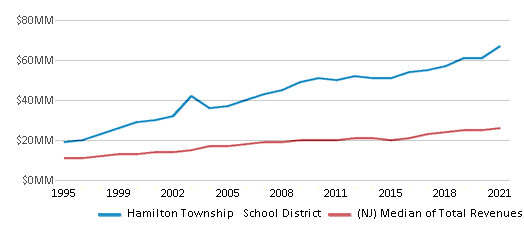
Spending
$68 MM
$35,142 MM
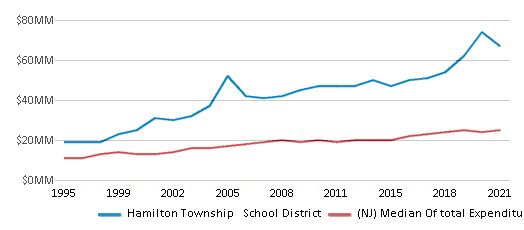
Revenue / Student
$23,361
$26,931
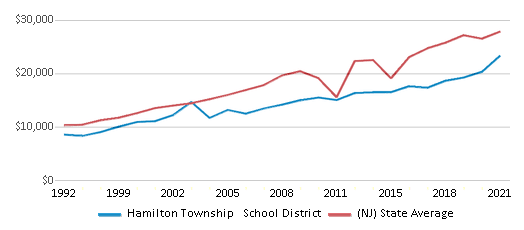
Spending / Student
$23,642
$25,828
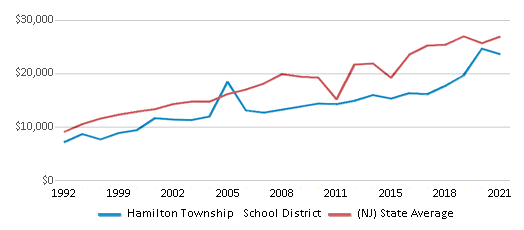
Best Hamilton Township School District Public Middle Schools (2025)
School
(Math and Reading Proficiency)
(Math and Reading Proficiency)
Location
Grades
Students
Rank: #11.
William Davies Middle School
(Math: 14% | Reading: 22%)
Rank:
Rank:
2/
Bottom 50%10
1876 Dr Dennis Foreman Drive
Mays Landing, NJ 08330
(609) 476-6241
Mays Landing, NJ 08330
(609) 476-6241
Grades: 6-8
| 883 students
Recent Articles

Year-Round Or Traditional Schedule?
Which is more appropriate for your child? A year-round attendance schedule or traditional schedule? We look at the pros and cons.

Why You Should Encourage Your Child to Join a Sports Team
Participating in team sports has a great many benefits for children, there is no doubt. In this article you will learn what those benefits are.

White Students are Now the Minority in U.S. Public Schools
Increasing birth rates among immigrant families from Asia and Central and South America, combined with lower birth rates among white families, means that for the first time in history, public school students in the United States are majority-minority. This shift in demographics poses difficulties for schools as they work to accommodate children of varying language abilities and socio-economic backgrounds.





